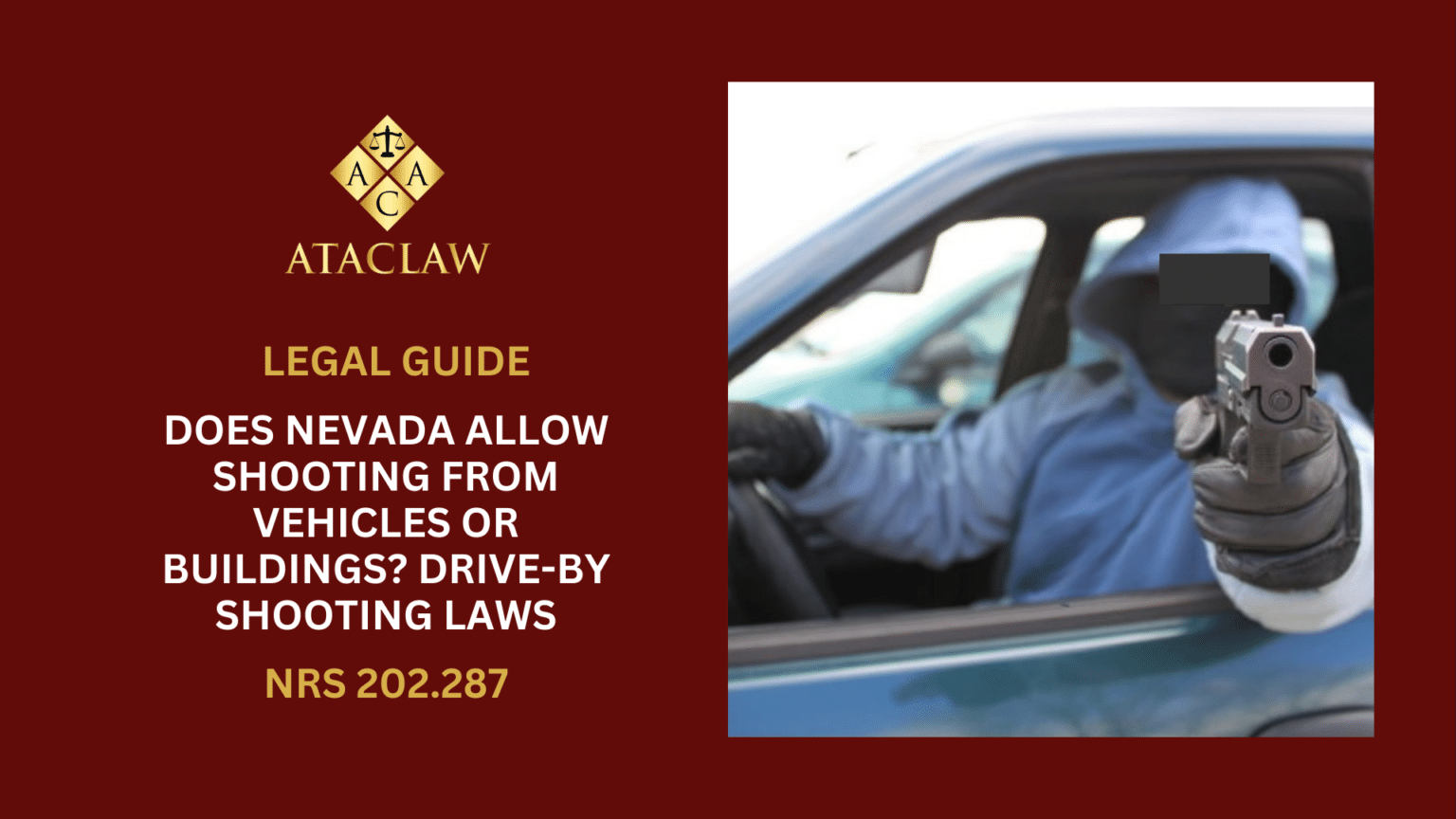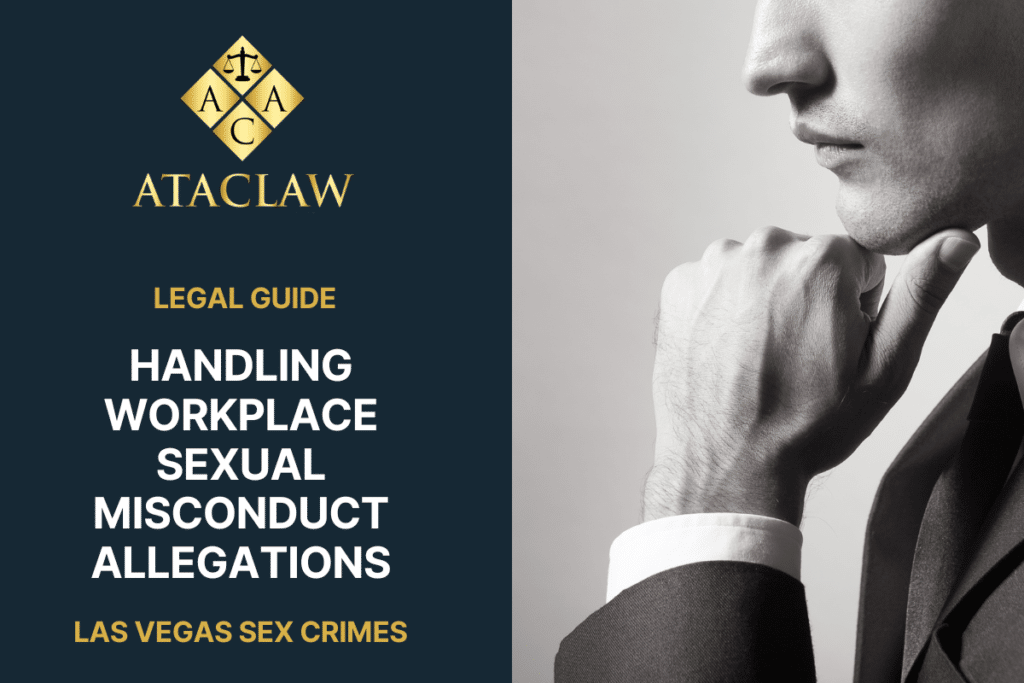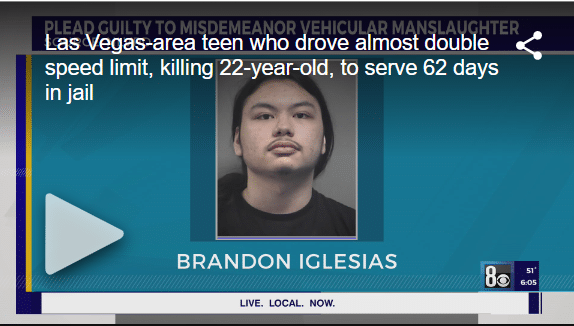Nevada Revised Statutes 202.287 strictly prohibits the act of discharging a firearm wantonly or maliciously from inside a vehicle or structure. Whether it’s fired from a house, office building, or even a tent, the use of a gun in such circumstances carries severe penalties, especially within populated areas. Acting in self-defense, licensed hunting activities, on-duty police officers, and actions within the lawful course of business are some of the few exceptions to the rule. However, despite the intentions behind the shooting, drive-by shootings in Nevada are treated with utmost seriousness. Even if no one is harmed, suspects face significant charges under NRS 202.287, primarily classified as a Category B felony.
What is NRS 202.287 all about?
In Nevada, engaging in the reckless act of firing a gun from within any structure or vehicle is heavily penalized under NRS 202.287. This statute identifies the act of discharging a firearm “maliciously or wantonly” within or from any building or means of transportation as a criminal offense, regardless of whether the bullet remains within or exits the structure or vehicle. The law does not differentiate based on the shooter’s position—whether they are inside, atop, or beneath the structure or vehicle in question.
NRS 202.287 encompasses a wide array of structures and vehicles. Under this statute, a “structure” can be anything from a temporary tent to a permanent residence or commercial building, including but not limited to:
- Houses
- Apartments
- Stores
- Mills and barns
- Outhouses
Tents - Any other type of building
Similarly, “vehicle” is defined broadly to include any motor vehicle or trailer—whether self-propelled, operated on rails, or powered by electricity from overhead wires—such as:
- Motorcycles
- Cars
- Trucks
- Trains
- Trolleys
Being implicated in such irresponsible behavior can lead to facing multiple charges. For instance, let’s consider a scenario where an individual named Alex decides to discharge a firearm into the air from within their vehicle in a neighborhood reputed for gang activity. Not only could Alex be prosecuted for violating NRS 202.287, but they might also face charges for reckless endangerment due to the potential risk their actions pose to others. Furthermore, if Alex’s actions were gang-related, they could face enhanced sentencing. Possessing a hidden firearm without a valid permit could add a charge of carrying a concealed weapon to the list.
How Does Nevada Handle the Prosecution of Drive-By Shootings?
It’s important to note that acts of negligence or accidents do not fall under the violation of NRS 202.287. For example, imagine a person named Jesse, who while driving through a busy street, accidentally fires their gun while trying to grab something from their bag. In such a case, if it can be demonstrated that the discharge was accidental rather than intentional, the charges associated with NRS 202.287 should, in principle, be dismissed.
Distinguishing Willful Acts from Accidents
Drive-by shootings can lead to a myriad of additional legal charges depending on the specifics of the incident. These can range from attempt to commit murder, illegal firearm possession, involvement in gang activities, to causing property damage. Each of these charges carries its own set of evidentiary standards and complexities.
The responsibility lies with the District Attorney (D.A.) to establish the guilt of the defendant for every charge levied against them beyond a reasonable doubt. This judicial standard means that a defendant might be found guilty for certain acts while being acquitted for others, depending on the strength of the evidence presented.
What is the Punishment for Discharging a Firearm from a Vehicle or Building in Nevada
In Nevada, the legal consequences of discharging a firearm from a building or vehicle significantly vary based on the location of the act. When the action occurs outside of a legally designated populated area, it is treated as a misdemeanor, carrying potential penalties that can include up to six months in jail and/or fines reaching $1,000.
However, the stakes are much higher if the discharge happens within a populated area. Under these circumstances, the offense escalates to a category B felony according to NRS 202.287. The severity of the crime reflects in the punishment, which can span from one to ten years in prison, in addition to fines that may amount to as much as $5,000.
A felony conviction for discharging a firearm from a vehicle or structure carries further long-term consequences. One of the most significant repercussions is the loss of the right to own, possess, or manage firearms. Regaining these rights is only possible through a pardon in Nevada, which underscores the gravity and lasting impact of such a conviction.
How Can I Defend Myself Against Firearm Discharge Charges in Nevada?
Defending against firearm discharge charges in Nevada involves understanding the specific defenses that align with the circumstances of your case. ATAC LAW outlines several effective strategies that may apply:
- Accidental Discharge Without Malice: Nevada’s statute NRS 202.287 specifically targets wanton or willful discharges of firearms. If your actions were accidental or due to negligence, you might not be held liable under this offense. For instance, if an individual, let’s call him Alex, accidentally discharges a firearm while having a medical episode, such as a seizure, this could be used to argue against the charges, provided it can be proven that the discharge was truly accidental.
- Self-Defense: Discharging a firearm in self-defense aligns with Nevada’s laws on self-protective measures. If you, in a situation similar to one where an individual named Jordan is confronted in a threatening manner by an assailant in a secluded alley, found yourself in imminent danger and used a firearm to defend yourself, your actions could be justified under self-defense. This defense hinges on demonstrating that you had a reasonable fear for your life or bodily harm. For example, if Jordan is approached aggressively by an individual wielding a weapon, Jordan’s decision to fire a weapon in self-defense could potentially exempt him from criminal charges, provided that there is sufficient evidence to support a genuine perception of imminent threat.
- Hunting in Compliance with Regulations: Legal hunting activities that involve discharging firearms from vehicles or structures could present a defense, as long as they adhere to Nevada’s hunting laws, specifically NRS 503.010, ensuring that the activity is conducted lawfully.
- Peace Officers in Official Duties: Law enforcement officers performing their responsibilities are allowed to discharge firearms from any location. This defense applies if you, in your role as a peace officer, were engaged in official duties at the time of the incident.
- Legal Exceptions for Certain Activities: Certain scenarios, like discharging a firearm at a licensed shooting range or during a sanctioned event, are not considered crimes as they fall under lawful activities. Demonstrating participation in such legal activities or events could be a defense.
Is Engaging in a Drive-By Shooting Considered a Federal Offense?
Indeed, participating in a drive-by shooting not only constitutes a state violation but also falls under the category of a federal crime. ATAC LAW points out that while under federal jurisdiction, the specifics of a drive-by shooting are defined more narrowly compared to state laws like Nevada’s:
- Targeted Shooting: The act must involve firing a weapon from a motor vehicle with the intent of shooting toward a gathering of at least two people.
- Intent: There must be an evident purpose to frighten, injure, harass, or cause serious harm.
- Connection to Drug Crimes: The act must serve to aid, or as a means of evading detection, for a substantial drug-related offense.
- Risk and Consequences: The action must result in a significant danger to life or directly cause a fatality.
The repercussions for a drive-by shooting at the federal level are more severe than state punishments, with the possibility of a twenty-five-year sentence in federal prison—or even a life sentence if the drive-by shooting results in a fatality.
At ATAC LAW, we urge residents and visitors in Nevada to understand the gravity of these offenses and the legal implications that follow. Navigating through the consequences of such actions requires expert legal counsel. Our team is committed to providing guidance and representation for those who find themselves entangled in complex legal situations. Awareness and adherence to laws like NRS 202.287 are essential for ensuring the safety and security of all citizens.
If you or someone you know is involved in a case concerning the discharge of a firearm from a vehicle or building, securing professional legal assistance is an essential step toward ensuring a fair legal process and working towards the best possible outcome. With the complexities of Nevada’s laws and the significant consequences at stake, the expertise and guidance of ATAC LAW can be an invaluable asset.
For further legal assistance and to discuss your case with an expert, don’t hesitate to contact ATAC LAW.




